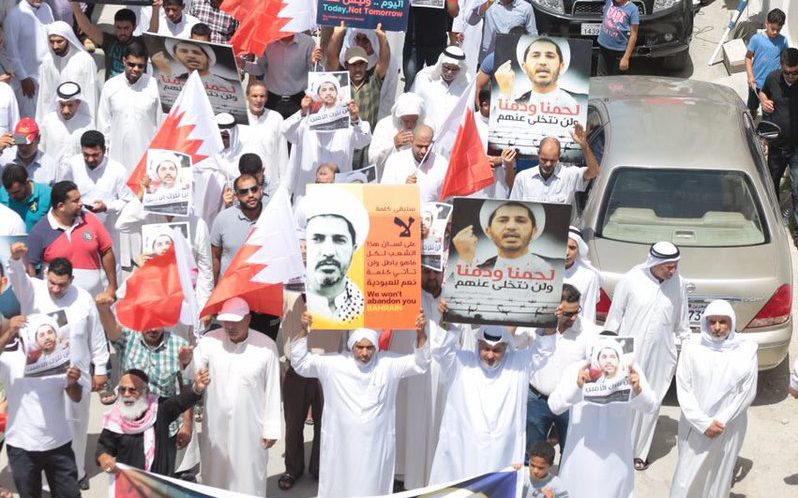14 June 2016- The Bahraini government today closed Al-Wefaq National Islamic Society, the largest political society in the country, on charges that the organization supported sectarianism and terrorism. We, the undersigned NGOs, condemn the Bahraini government’s decision to dissolve al-Wefaq. We express grave concern over the government’s continued persecution of its political opposition and its elevated assault on peaceful dissent.
Bahrain’s Ministry of Justice submitted a request to the Administrative Court for an emergency order to shut down al-Wefaq this morning. The court approved the request two hours later, which went into effect immediately. Bahraini authorities ordered al-Wefaq suspended, froze all of the society’s assets, halted all of its activities, and closed the headquarters. Al-Wefaq’s website is now blocked in Bahrain.
The Bahraini government rationalized its decision by asserting that al-Wefaq supported a sectarian political platform that countered national unity, owed allegiance to “foreign religious and political” entities, supported terrorism and extremism that threaten the state, and called for foreign intervention. The court arrived at its decision without allowing al-Wefaq’s attorneys to present their defense.
Al-Wefaq is Bahrain’s single largest political society. It is a national pro-democracy movement, and as such Bahrain’s government has long targeted its members. In 2011, during a speech before the United Nations General Assembly, US President Barack Obama urged the government of Bahrain to engage with al-Wefaq. “America is a close friend of Bahrain, and we will continue to call on the government and the main opposition bloc — the Wifaq — to pursue a meaningful dialogue that brings peaceful change that is responsive to the people.”
“The international community and the United States need to vocally oppose the Bahraini government’s suspension of al-Wefaq,” said ADHRB Executive Director Husain Abdulla. “It is a clear sign of the Bahraini government disregarding the political and human rights of its citizens,” he continued.
The suspension of al-Wefaq appears to be just one part of a recent government campaign magnifying its assault on dissent. Also today, the Ministry of Social Development closed the doors of two non-profit Shia religious and social organizations for allegedly illegally collecting money. Their social activities mainly included supporting orphans and the poor. Yesterday, the government arrested prominent human rights activist Nabeel Rajab, charging him with spreading false news and insulting the integrity of the state over social media. Prior to that, Bahrain’s government imposed travel bans upon activists attempting to travel to Geneva, Switzerland to take part in the 32nd Session of the Human Rights Council. One week ago, Bahrain’s Court of Appeals increased the sentence against al-Wefaq’s Secretary-General, Sheikh Ali Salman, from four to nine years in prison.
Hugh Ali, the Executive Director of Justice Human Rights Organization, stated, “This most recent attack on the civil liberties of the people of Bahrain is troubling and indicative of a growing culture of impunity that seems to pervade the government of the Kingdom.” He added, “This action would see the people deprived of their main official channel of voicing their concerns; it is disconcerting and must be addressed by members of the international community.”
Al-Wefaq and its members have been the subjects of ongoing judicial harassment. The government suspended the society in October 2014, a month ahead of Bahrain’s first General Elections since the 2011 Arab Spring. In 2015, former MP Sayed Jameel Kadhem received a six month prison term and Wefaq member Majeed Milad received a two-year sentence, both on charges related to their speech. In 2013, the government arrested al-Wefaq’s Deputy Secretary General, Khalil al-Marzooq, on charges related to his exercise of free expression. Al-Marzooq was at the time prominently involved in the ongoing National Dialogue towards political reconciliation; the government arresting him caused it to collapse.
“Bahrain is bulldozing its civil society and is making a mockery of their ally the UK, who welcomed Bahrain’s ‘commitment to reform’ just two weeks ago. Bahrain is only reforming itself into a state of silence and terror,” said Sayed Ahmed Alwadaei, Director of Advocacy at BIRD. On a visit to Bahrain at the end of May, Philip Hammond welcomed Bahrain’s “commitment to reform”, on the same day that an appeals court increased Al Wefaq’s leader’s prison sentence by more than double.
We, the undersigned NGOs, call upon the governments of the United States, the United Kingdom, and the European Union to publicly condemn the Bahraini government’s suspension of al-Wefaq and targeting of the political opposition. The current situation in Bahrain has moved beyond quiet diplomacy. International voices must denounce the government of Bahrain’s actions and urge it to respect the rights to freedom of expression and freedom of speech.
Signed,
Americans for Democracy & Human Rights in Bahrain (ADHRB)
Bahrain Institute for Rights and Democracy (BIRD)
Bahrain Center for Human Rights (BCHR)
European Centre for Democracy and Human Rights (ECDHR)
Justice Human Rights Organisation (JHRO)





